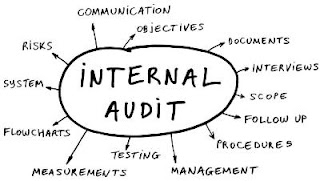Preparation
is the key to an effective, thorough and a value-added internal audits program. Internal auditors cannot be content by
preparing for the audit not by giving sufficient time to achieve their
objectives. They will be required to have enough time on their hands to prepare
for the job ahead. They should be aware about the fact that if the audit is
expected to last for a couple of hours, the preparation for the job will take
at least 2 1/2 times the amount of time. Therefore, they will be required to allot
sufficient time for the preparation without which they are likely to run out of
questions before the completion of the audit.
It
is quite easy to comment about the time needed for the audit but in reality, is
quite difficult, especially for the auditors. The time restrictions placed on
them are the major obstacles they face when they decide to allocate enough time
and prepare for the job they are required to complete. It is quite possible for
them to have other responsibilities than internal auditing competing for the
time available with them. In such conditions auditors will do well to follow
the example by many trained internal auditors and learn how to spread their
workload. This will lead to better preparation and completion of the audit as
required by the laws.
Effective
planning for internal auditing requires auditors to follow some steps, which
are simple and will allow them to perform their duties effectively. Auditors
must be prepared to understand how they can allocate the time needed to manage
such tasks in the best manner. They cannot be under the impression that they
will be able to handle such issues within a short time. They will be required
to allocate some time even for the learning of the simple steps that have been
mentioned below:
- They will have to learn the process.
- They have to identify with the interfaces within the standard.
- They need to understand proper compliance to the standard and also to identify with process interfaces and potential process failure modes.
- Reviewing old audits, developing audit questions and the audit plan will also be a requirement, which they will not be able to ignore.
They
are required to become familiar with the process before they begin to audit the
same. They need to know the working of the process, what the objectives are,
what are the outputs, inputs, activities, resources and controls. The amount of
knowledge they need to collect is vast and can make an ordinary individual feel
he or she may not be suitable to the task. However, these are requirements,
which will have to be overcome by people who have decided to get into the
business of internal auditing.
Understanding
a process alone will not be of any help unless the auditor is willing to
consider his or her role within the process of auditing. It is absolutely
necessary for them to be fully prepared to conduct the audit in an impartial
manner by looking for any information provided with an open mind. It is a
foregone conclusion that they will not be able to complete their job
effectively if they are not fully aware of their responsibilities and the way
they are required to conduct themselves.
Auditors
will be required not to forget their role as the guardians of the process they
are required to audit. They should be making every attempt to energize their
internal auditing program by getting all the information they need and
performing their roles to the best of their knowledge.

No comments:
Post a Comment